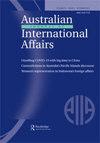在太平洋岛国陷害中国
IF 2.7
3区 社会学
Q2 INTERNATIONAL RELATIONS
引用次数: 5
摘要
许多澳大利亚人是如何接受在太平洋岛屿上必须与中国竞争而不是合作的?我们使用话语分析技术来研究过去十年(2011-2021年)澳大利亚官方话语、媒体和评论中的框架在构建中国在该地区存在的威胁中所起的作用,以至于许多澳大利亚人已经接受旨在与中国竞争的政策是最合理的外交和战略政策回应。我们发现,直到2018年,澳大利亚官方话语的特点是对中国的作用持有条件的乐观态度,当时出现了对竞争的更明确强调。与这一转变相呼应的是,尽管媒体和(大部分)评论在过去十年中将中国的角色定义为威胁和竞争,但这种定义在2018年显著增加。澳大利亚政府在太平洋岛屿上对中国的政策方针,不可能与它对中国在澳大利亚、印太地区和全球日益积极的作用的更广泛理解相分离。但我们的研究结果表明,通过持续地将中国描述为威胁和竞争,媒体和(在较小程度上)评论创造了一个有利的环境,使公众接受澳大利亚政府政策的变化。本文章由计算机程序翻译,如有差异,请以英文原文为准。
Framing China in the Pacific Islands
ABSTRACT How did many Australians come to accept that competition, rather than cooperation, with China was necessary in the Pacific Islands? We use discourse analysis techniques to examine the role that framings in Australian official discourse, media, and commentary over the last decade (2011–2021) played in constructing China’s presence in the region as threatening such that many Australians have accepted that policies aimed at competing with China are the most reasonable foreign and strategic policy response. We find that Australian official discourse was characterised by qualified optimism about China’s role until 2018, when a more explicit emphasis on competition emerged. Echoing this shift, while the media and (much of) the commentary framed China’s role in terms of threat and competition throughout the decade, this framing increased significantly in 2018. It is impossible to isolate the Australian government’s policy approach to China in the Pacific Islands from its broader understanding of China’s increasingly activist role in Australia, the Indo-Pacific, and globally. But our findings suggest that, by consistently framing China in terms of threat and competition, the media and – to a lesser extent, commentary – created an enabling environment for the public to accept changes to the Australian government’s policies.
求助全文
通过发布文献求助,成功后即可免费获取论文全文。
去求助
来源期刊

Australian Journal of International Affairs
INTERNATIONAL RELATIONS-
CiteScore
3.20
自引率
13.30%
发文量
44
期刊介绍:
AJIA is the journal of the Australian Institute of International Affairs. The Institute was established in 1933 as an independent and non-political body and its purpose is to stimulate interest in and understanding of international affairs among its members and the general public. The aim of the Australian Journal of International Affairs is to publish high quality scholarly research on international political, social, economic and legal issues, especially (but not exclusively) within the Asia-Pacific region. The journal publishes research articles, refereed review essays and commentary and provocation pieces. ''Articles'' are traditional scholarly articles. ‘Review essays’ use newly published books as the basis to thematically examine current events in International Relations. The journal also publishes commentaries and provocations which are high quality and engaging pieces of commentary, opinion and provocation in a variety of styles. The Australian Journal of International Affairs aims to analyse international issues for an Australian readership and to present Australian perspectives to readers in other countries. While seeking to stimulate interest in and understanding of international affairs, the journal does not seek to promote any particular policies or approaches. All suitable manuscripts submitted are sent to two referees in a full ''double blind'' refereeing process.
 求助内容:
求助内容: 应助结果提醒方式:
应助结果提醒方式:


